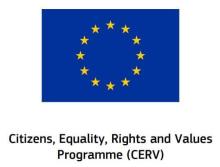The Menedék – Hungarian Association for Migrants is participating in an international project with the support of the European Union, in cooperation with Slovenian, Croatian, French and Swedish NGOs. The main objective of the project is to support the fight against discrimination and racism. The focus of the project is on local communities and it aims to promote the integration of immigrants and refugees in particular.
In the EU-funded CIFER project (City for everybody - building responsible action for inclusive local communities), Menedék works together with NGOs from other Member States to combat racism and discrimination and to promote the social integration of migrants and refugees. The CIFER project forms part of the European Union's Citizens, Equality, Rights and Values Programme (CERV). CERV aims at protecting and promoting the rights and values as enshrined in the EU Treaties and the Charter of Fundamental Rights. The programme attempts to strengthen open, rights-based, democratic, equal and inclusive societies based on the rule of law. The partners in the CIFER project are the Slovenian Mirovni Institut, the Croatian Udruge Centar Za Mirovne Studije, the Swedish Nätverket - Idéburen Sektor Skåne, and the French NGO France Terre d'Asile.
The CIFER project acknowledges that the integration of migrants is inherently connected to racism and discrimination. In order to more effectively combat racism, the project aims at addressing intersectional forms of migrant discrimination at the local level. Each project partner will involve four local communities in the course of the project activities: first and foremost, local migrant communities and refugees, but also municipality and educational workers, and local NGOs. Together, with the participation of these local groups, the CIFER project aims to: 1. empower migrant communities, particularly vulnerable groups affected by intersectional discrimination, 2. strengthen the capacities of members of the local municipality and educational institutions by increasing their knowledge to combat racism and discrimination, 3. as well as help the aforementioned groups to stand up against racism and discrimination by using bystanders' responsibility approach, 4. build coalitions between migrant and local communities, 5. and, lastly, to prepare the ground for the production of an Anti-racism Action Plan at local level, thus contributing to implementation of the EU Anti-racism Action Plan.
In Hungary, Menedék aims at amplifying the voices of immigrants and refugees living in Budapest and use their experiences to fight racism and discrimination more effectively. As part of the fight against racism and discrimination, several EU cities have adopted Anti-racism Action Plans in recent years, and Menedék, with the involvement of experts, will use these as a model to draw up a draft adapted to the conditions in Budapest. In order to better understand the local context, Menedék, in coordination with the partner organisations, plans three main steps before outlining the "Action Plan": 1. research (desk research, focus groups and interviews), 2. developing a new training course related to the Action Plan, 3. organisation of study visits abroad to learn from good practices. The planned Budapest Anti-racism Action Plan will therefore be based on extensive research and international exchange of experience and will be implemented with the active participation and perspectives of experts, educators, administrators, immigrant and refugee communities. It is also an important objective of Menedék to ensure that the results of the CIFER project are regularly communicated to the general public.

